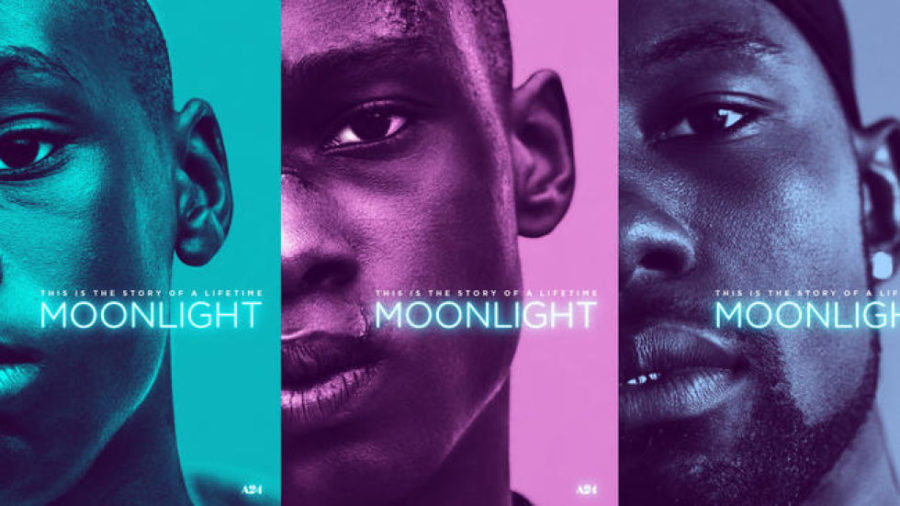In the aftermath of its big win at the Oscars, “Moonlight” is a sleeper hit. Once an unknown film showing in a few select theaters, “Moonlight” went into wider release after it won Best Picture at the Golden Globes. With its bold storytelling and cinematography, the victory was well-deserved.
If you ask someone what “Moonlight” is about, they might say it’s about a gay black boy or a couple. Well, it’s a little more than that. It chronicles the life of a young boy named Chiron (Alex Hibbert) from childhood to adulthood in a rough neighborhood of Miami. Imagine “Boyhood,” but with an all-African American cast.
The film starts with a group of schoolchildren chasing Chiron (a.k.a. Little). He manages to evade them by holding up in an abandoned motel (read: dope house). After a while, a drug dealer named Juan (Mahershala Ali) finds him.
When you hear drug-dealer, you’re probably thinking about a career criminal who is the absolute worst of human society. That is not Juan. He takes Chiron into his own home while trying to get him to reveal where he lives and who his parents are. After spending the night with Juan and his girlfriend, Chiron finally tells them where he lives. However, their relationship does not end there. Chiron continues to visit Juan and he becomes the father figure Chiron never had.
Then there is Chiron’s mother, Paula (Naomie Harris). At first, she is shown to be a rather decent mother, yet a little defensive of her parenting techniques. Soon, though, she is shown seeing a shady man and appliances start disappearing. If you haven’t guessed it by now, Paula is a drug addict. This leads to heated tension between her and Juan, not to mention a rather unstable situation at home for Chiron.
The film itself rates an A-. It is an independent film through and through. The story is subtle, yet packs a hefty punch. Many details of the plot are implied rather than implicitly stated. For example, it is never mentioned in the film that the story takes place in Miami. In fact, one might assume everything takes place in Los Angeles. It is only in the later half of the film it is revealed through dialogue that they are actually on the opposite coast.
The best aspect of the film is its cinematography, which speaks volumes. From the very first shots, we are introduced to the expressive camerawork prevalent among independent films. In the first scene, we see the camera circle around Juan as he speaks with one of his associates. In that same scene, we also see the camera shake violently as it follows Chiron running. There was one scene where Chiron engages in a playful wrestling match with Kevin (Jaden Piner), his only friend. It’s okay if you feel uncomfortable watching these two boys roll around, as what the camera chooses to show and linger on gives off suggestive undertones. An average movie uses a camera to capture the story. A great film uses the camera to tell the story.
If there is any flaw to this film, it would be that the atmosphere sometimes slows to a snail’s pace. This is intentional and largely caused by Chiron’s character. Chiron, for the most part, is a quiet character. When we meet him first, he does not speak for a good ten minutes or so. He is not very expressive either. Most of the time, he has an emotionally dead look on his face as he drifts through his day-to-day activities.
It’s as if his body is on autopilot while his mind constantly contemplates what his life is coming to. There are times when this emotionless stupor brilliantly shows how Chiron deals with his immense inner turmoil. There are also times where Chiron’s aloofness gets downright frustrating to the point where you want to scream “Come on, Little! You’re going to let them call you that?! Do something!”
In the end, Chiron seems distant, not only from the characters in the film, but to the audience as well.
Now let’s get down to what everyone is talking about. Part, if not most, of “Moonlight”’s popularity is because it is about a homosexual African-American man. That is only a small portion of what makes this film good.
Impactful storytelling and strong camerawork make a phenomenal film no matter what.
The intersection between sexuality and race does set “Moonlight” apart from other films of similar caliber. It makes you sympathize with Chiron and his situation even if you aren’t gay or black.
But don’t expect to leave the theater with tear stains or a smile. Sadness and joy aren’t the emotions this film aims for. Instead, you’ll feel what Chiron is (probably) feeling: admiration and respect for Juan, resentment for Paula, alienation from his peers, and uncertainty of what’s around the corner.
What “Moonlight” really deserves recognition for is how it breaks the mold. Nearly everything about it, from dialogue to character, plot to cinematography, pushes the envelope of filmmaking. It takes risks that, while not playing out exactly how the audience, might expect them to, it still deserves applause.
Unfortunately, while “Moonlight” will likely be a big hit for the next month or so, it will fade away like so many other best picture winners and nominees. Don’t believe it? When’s the last time you saw or even heard about “The Artist”?
On March 1, “Moonlight” will be shown at the Petaluma campus as part of the Cinema Series. Anyone who is interested in seeing this exceptional film for themselves are more than welcome to come.




